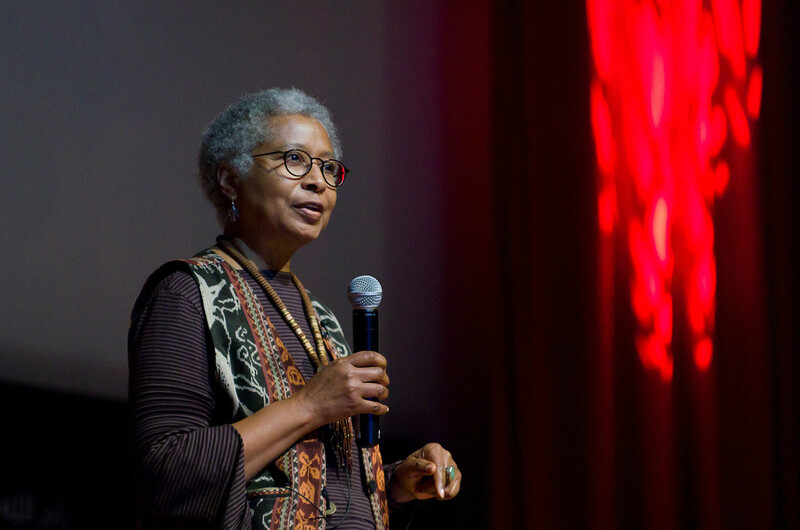Activism and BDS Beat 19 June 2012

Alice Walker speaks in the occupied West Bank city of Ramallah.
TEDxRamallahJump to Update: JTA changes text of report
A JTA (Jewish Telegraphic Agency) report that was carried by Haaretz, accuses Pulitzer prize-winning author Alice Walker of refusing to allow her iconic book The Color Purple to be translated into Hebrew:
Alice Walker, author of “The Color Purple,” refused to authorize a Hebrew translation of her prize-winning work, citing what she called Israel’s “apartheid state.”
In a June 9 letter to Yediot Books, Walker said she would not allow the publication of the book into Hebrew because “Israel is guilty of apartheid and persecution of the Palestinian people, both inside Israel and also in the Occupied Territories.”
In her letter, posted Sunday by the Palestinian Campaign for the Academic and Cultural Boycott of Israel on its website, Walker supported the boycott, divestment and sanctions movement and offered her hope that the BDS movement “will have enough of an impact on Israeli civilian society to change the situation.”
But Walker’s 9 June letter to Yediot Books, full-text of which is posted on the website of PACBI, does not even mention the Hebrew language.
The JTA/Haaretz spin that makes it appear as if Walker were objecting to her book being in Hebrew is a complete distortion.
“Now is not the time”
Nor does the report mention that in making the comparison with apartheid South Africa, Walker said that she would wait until a post-apartheid future before allowing her book to be published by an Israeli publishing house. When it came to having her works published in South Africa, Walker wrote:
We decided to wait. How happy we all were when the apartheid regime was dismantled and Nelson Mandela became the first president of color of South Africa.
Only then did we send our beautiful movie! And to this day, when I am in South Africa, I can hold my head high and nothing obstructs the love that flows between me and the people of that country.
Which is to say, I would so like knowing my books are read by the people of your country, especially by the young, and by the brave Israeli activists (Jewish and Palestinian) for justice and peace I have had the joy of working beside. I am hopeful that one day, maybe soon, this may happen. But now is not the time.
The Naomi Klein precedent: boycotting the Israeli economy
Rather, Walker appears to be following the precedent set by Naomi Klein, who also shunned a mainstream Israeli publisher in order to respect the Palestinian call for boycott, divestment and sanctions. As Klein explained:
For eight years, my books have been published in Israel by a commercial house called Babel. But when I published The Shock Doctrine, I wanted to respect the boycott. On the advice of BDS activists, including the wonderful writer John Berger, I contacted a small publisher called Andalus. Andalus is an activist press, deeply involved in the anti-occupation movement and the only Israeli publisher devoted exclusively to translating Arabic writing into Hebrew. We drafted a contract that guarantees that all proceeds go to Andalus’s work, and none to me. In other words, I am boycotting the Israeli economy but not Israelis.
Klein explained this in the context of refuting the bogus claim that boycotts harm “dialogue”:
Coming up with our modest publishing plan required dozens of phone calls, e-mails and instant messages, stretching from Tel Aviv to Ramallah to Paris to Toronto to Gaza City. My point is this: as soon as you start implementing a boycott strategy, dialogue increases dramatically. And why wouldn’t it? Building a movement requires endless communicating, as many in the antiapartheid struggle well recall.
Update: JTA changes text of report
JTA changed the text of its report after this post was brought to the attention of its editor, Ron Kampeas:
The new version now indicates that Walker objected to an Israeli publisher, rather than the Hebrew language:(JTA) — Alice Walker, author of “The Color Purple,” refused to authorize a Hebrew translation of her prize-winning work, citing what she called Israel’s “apartheid state.”
In a June 9 letter to Yediot Books, Walker said she would not allow an Israeli house to publish the book because “Israel is guilty of apartheid and persecution of the Palestinian people, both inside Israel and also in the Occupied Territories.”





Comments
Dialogue
Permalink Rachel Lever replied on
Excellent point by Klein: BDS has created dialogue where there was none before, and this is exactly what Israel's regime fears most. Its increasing censorship, campaigns to silence anti-Zionist speakers on university campuses, and harassment of the press, shows that dialogue, and the free speech that's necessary for such dialogue, is the last thing on its mind.